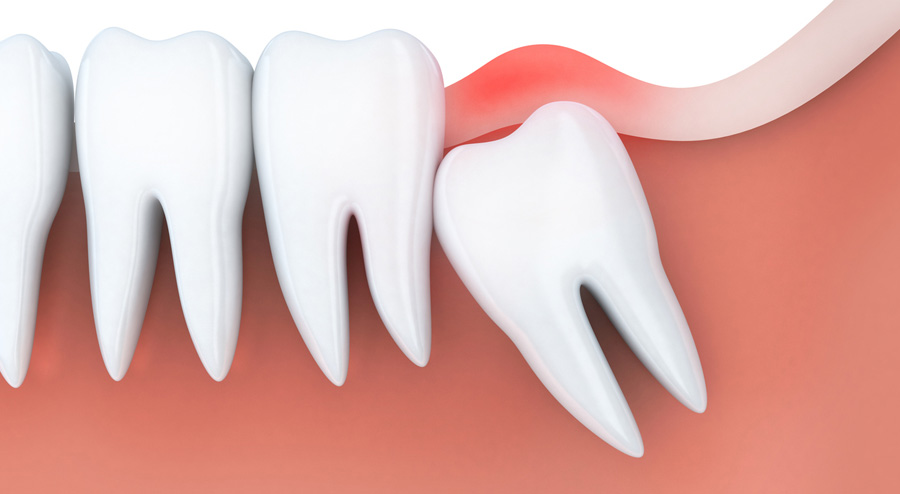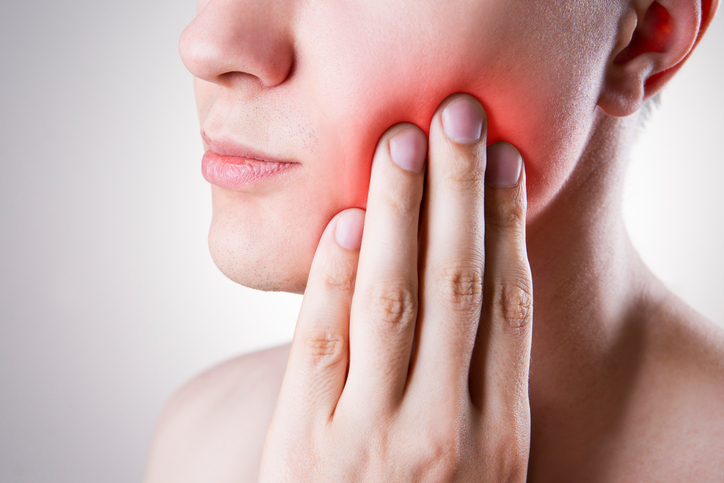Wisdom Teeth Symptoms to Watch Out For

Wisdom teeth are formally known as the third molars as that is their actual position and function in the mouth. Since they come in several years after the rest of the teeth, however, the moniker “wisdom teeth” gets applied. Wisdom teeth come in so late because the mouth and jaws must be almost fully grown and developed in order to ensure adequate room for this last row to appear. Unfortunately, for many reasons, it is often the case that one or more of the four wisdom teeth is impacted or grows in incorrectly. When this happens and goes untreated there can be a whole host of complications, such as pressure on and crowding of the other teeth, infection, and even damage to the jawbone and nerves around the tooth site.
Given the high frequency of impacted wisdom teeth and the severity of their complications, most dentists will keep an eye on the development of wisdom teeth before eruption. These teeth develop in a sac in the jaw, beneath the gumline. They can, therefore, be viewed with X-rays as they grow. Dentists usually take at least one set of X-rays per year in order to monitor various situations in the mouth and jaw, like cavities. Being able to check the progress of wisdom teeth is just another benefit and allows the dentist to gauge the potential for problems for the patient long before any symptoms come up.
In some cases, one may not have the ability to visit the dentist on a regular basis. This may be due to finances, availability, or a severe phobia. Sometimes, even people who reach adulthood with no problems from their wisdom teeth may start having complications and need to get them removed. If any of these situations apply to you, then it can help to understand what symptoms to look out for in order to determine if further action needs to be taken.
Pain

If a wisdom tooth is impacted and not growing in properly you may have pain in your gums. This can be either sharp and occasional or achy and persistent. Redness, bleeding, and swelling can also accompany this pain. If an infection or abscess has occurred then there will likely be pain both in the gums and in the jaw itself. The jaw can be both painful and swollen and you might also have difficulty opening your mouth all the way.
Crowded or Crooked Teeth
In some cases, the impacted wisdom teeth might be putting enough pressure on the other teeth to move them but not enough to cause pain. If you notice that the teeth have started to become misaligned or overcrowded then the wisdom teeth might be shoving things around. This is especially concerning if you are past the pubescent years since at that point your jaw and teeth tend to be set in the position that they should be in permanently.
Infection
If an infection or abscess develops around the wisdom tooth, there may be other symptoms besides pain. The area can be unusually warm to the touch and swollen. The infection material may also cause an unpleasant taste in the mouth if it seeps out or bursts. The presence of infection can also cause you to have unusually bad breath. In some cases, a mild grade fever can also develop since the body is trying to fight the infection off. If your wisdom teeth have gotten to the point where these symptoms are present then it is imperative to visit the dentist and have the teeth removed so the infection can clear. Not treating this can cause serious damage to the nerves and jaw.
Conclusion
There are many ways in which wisdom teeth might come in improperly and cause problems in the mouth. They might grow forward into the second molars or grow in backward toward the back of the mouth. They can also grow in sideways in any direction or not even fully form at all and instead simply cause irritation and infection. Depending on which situation occurs the possible symptoms can change. For example, a tooth growing in sideways or backward will probably not cause any pain or crowding in the other teeth but can certainly cause jaw pain.
It is very important to visit your dentist on a regular basis to keep an eye on the development of your wisdom teeth. It is not possible to prevent the wisdom teeth from growing in improperly or becoming impacted, but the dentist can usually identify the situation and schedule you for extraction long before this becomes a problem. If regular visits are not possible then pay attention to your symptoms and do not write them off, especially if they increase in severity over time. If you are experiencing any of these then a visit to the dentist is essential, as not treating problem wisdom teeth can cause much greater complications down the road.
Relate Posts to Read:
What Does Impacted Wisdom Tooth Pain Feel Like?
Medically Fact-Checked & Written by Our Dental Editorial Team
You can read more about our editorial guidelines by clicking this link and learn more about the Emergency Dentists USA editorial team here.


